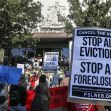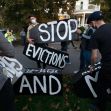In another twist of disappointment for small landlords, the 11th U.S. Circuit Court of Appeals rejected a bid by several landlords who were looking to get the nationwide moratorium set by the Centers for Disease Control on residential evictions overturned.
Four landlords along with the National Apartment Association, a real estate industry group, brought forward the complaint alleging that they were facing irreparable damages because of the prolonged eviction moratorium that kept tenants from paying their rent over the course of the pandemic. Interestingly enough, the ruling expressed that the courts had “doubts” whether or not the CDC had the authority to impose the residential eviction moratorium. However, they ruled that the plaintiffs failed to prove that they would suffer irreparable harm without the preliminary injunction.
The four landlords in question are located in Virginia, North Carolina, South Carolina and Georgia. The landlords behind the complaint are considered “mom and pop landlords,” a term used to describe individual investors. These mom and pop landlords do not have the backing that large realty corporations do and often depend on their rental income to pay off their own mortgages or the mortgage on the rental. Irreparable harm could constitute the loss of their property and the loss of their livelihood as many small landlords have depended on their rental income to stay afloat.
The 2-1 ruling written by Circuit Judge Britt Grant expressed several points that highlighted the concerns of the landlords. The opinion explains, “The CDC’s order ‘does not relieve any individual of any obligation to pay rent,’ but it does prohibit any landlord from evicting ‘any covered person’ from a residential property for nonpayment of rent while the order is in effect.”
The plaintiffs first brought forward their complaints and were seeking a preliminary injunction in September 2020 after the first moratorium was set in place and later extended several times. The 11th Circuit Judge J.P. Boulee, who heard their complaint in September, failed to grant the preliminary injunction after finding that the plaintiffs had not shown irreparable injury or a likelihood of success.
In this recent ruling, however, Judge Grant wrote that the Circuit Court of Appeals “doubted” Judge Boulee’s finding on the plaintiffs’ likelihood of success. Grant points to the statute that allows the CDC to impose emergency authority being one of narrow authority, limited to actions of destroying contaminated livestock.
The majority also wrote that there was no need to decide this issue because the plaintiffs failed to show that there was irreparable harm to the plaintiffs from both the loss of being able to access their property or their inability to collect on rent. Grant writes, "But we have never crafted a per se rule that any interference with an interest in real property is irreparable. And without more, we fail to see how the temporary inability to reclaim rental properties constitutes an irreparable injury."
The opinion goes on to explain that the landlords failed to prove that they would be unable to collect on the past rent and that although a tenant could not pay when rent was due does not mean that they would not be able to pay after the moratorium is over.
The opinion explains, “Indeed, issuing a preliminary injunction ‘based only on a possibility of irreparable harm’ would be ‘inconsistent’ with treating a preliminary injunction as an ‘extraordinary remedy.’ And the burden is on the plaintiffs to show that injury—we cannot rely on our own intuition about how things will play out.”
Senior Circuit Judge Gerald Tjoflat joined in the majority opinion. Circuit Judge Elizabeth Branch was the dissenting voice and wrote that a tenant who has not paid on past rent and certifies that they cannot pay through the moratorium is indeed an irreparable injury to the landlords. Branch wrote, "We cannot demand that the landlords continue to incur further debts from insolvent tenants based on even the most well-reasoned speculation about the tenants' future job prospects."
Lawyer Caleb Kruckenberg of New Civil Liberties Alliance is representing the landlords and shared following the ruling, "The court's decision sets a dangerous precedent about what an administrative agency can get away with when it utters the word 'emergency.'"
The original eviction moratorium was put into place at the start of the pandemic and was set to expire on December 31, 2020. As the deadline loomed, it was extended again to January 31, 2021, through the Consolidated Appropriations Act. It was extended yet again until the end of March 2021. Approaching that deadline, it was extended to the end of June 2021, and yet again until the end of July 2021.






